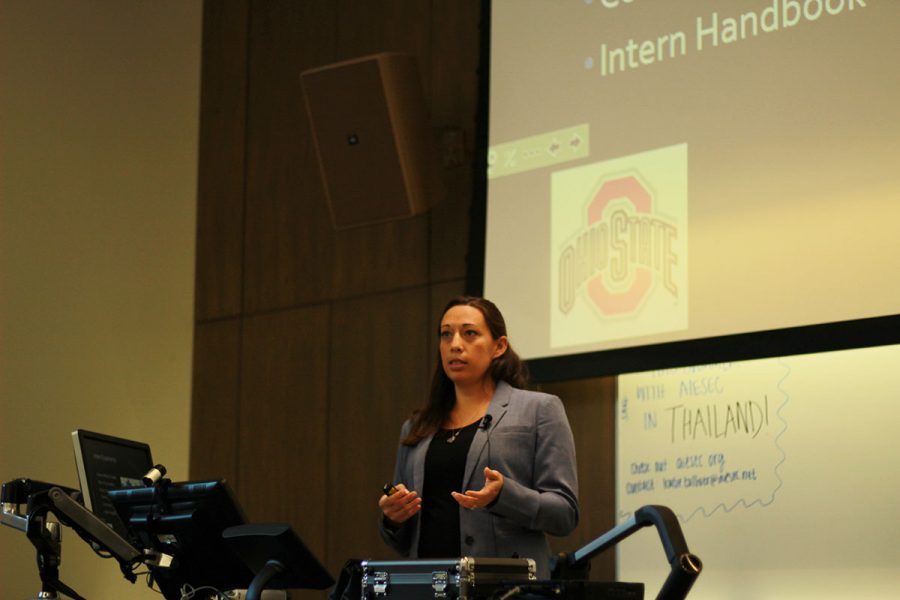Sonia Ruef shares story of perseverance at Women’s History Month event
Sonia Ruef became one of the first female athletic trainers in the NFL
More stories from Seth Abrahamson
UW-Eau Claire hosted Sonia Ruef, an athletic trainer for the Pittsburgh Steelers, on Friday. Ruef came to spread her story of hard work, perseverance and dedication that helped her become the second female athletic trainer in the NFL.
She came after her idol Ariko Iso, who became the first female athletic trainer in 2002 for the same team.
“One of my first athletic training jobs was working with Iso,” Ruef said. “I saw how much of an impact she was making on the NFL, and I saw myself in her shoes someday.”
The Pittsburgh Steelers hired Ruef in 2011, partly because of Iso, who had recently retired from the Steelers and moved on to Oregon State University where she has remained since.
However, that is not where her story starts — she would not be in the NFL today if it were not for her visit to Chapel Hill.
After receiving her undergraduate degree at UW-Madison and spending a year as an athletic trainer with various Division 1 programs, she decided to pursue her graduate degree at the University of North Carolina (UNC) and continue her training in the program with the football program.
“The head football athletic trainer — who previously worked in the NFL — encouraged me to apply for a summer scholarship in the NFL,” Ruef said. “He really helped me believe in myself and that I could succeed in the NFL if i put in the work.”
Ruef said she had not considered applying for an internship at the professional level before UNC because she was never exposed to it. After applying to work with the Steelers and Iso, who signed her on a summer intern, she continued seeking work in the NFL, but to no avail.
Ruef then decided to return to the college level and accepted a position as the head athletic trainer with the men’s gymnastics team at Ohio State University (OSU).
“This was a great stepping stone for me,” Ruef said, referring to OSU. “I was discouraged to not receive a lot of interest in the pros, but I knew if I continued to work hard I would eventually get attention.”
In 2011, the Steelers again reached out to Ruef to offer her the position as an assistant athletic trainer to replace Iso. Seven years later, Ruef said she hasn’t looked back and is proud of where she is today.
Ruef said accepting the position with the Steelers was not the defining moment in her career. Instead, it was during her fourth season with the team when she sat down with the NFL Commissioner Roger Goodell to discuss the role of women in the league.
Ruef said she was nervous yet excited to sit with the commissioner to see what improvements could be made for women.
“Honestly, I was not exactly sure what he was going to ask me,” Ruef said. “He asked me why I thought I was one of the few women in the industry and what I thought could be done to increase that. He took my advice to heart and I really appreciated that.”
Ruef said she told Goodell there are plenty of women who would thrive in the NFL if given the chance.
In 2014, less than a quarter of the scholarships and internships offered in the NFL were for women, Ruef said, but after the meeting with Goodell, 32 new scholarships were offered.
Three years after that meeting with Goodell, five women had been hired as athletic trainers.
“I know five does not seem like a large number,” Ruef said. “But compared to where we were when I was hired, we are making progress and I am encouraged by that.”
Ruef continues to encourage young, prospective female athletic trainers to be confident in their talents and chase their dreams in a field still dominated by men.
Amanda Pignato, a second-year business management student, said she came to the presentation because of her women’s studies class to see what kind of impact she was making as a woman in her industry.
“She was very inspiring,” Pignato said. “Her determination and all she went through, how she got to where she was — she has inspired me.”


